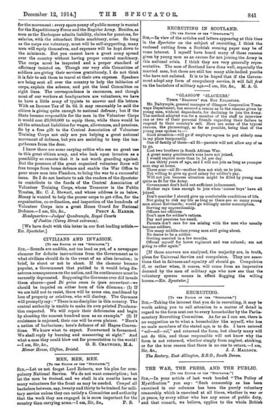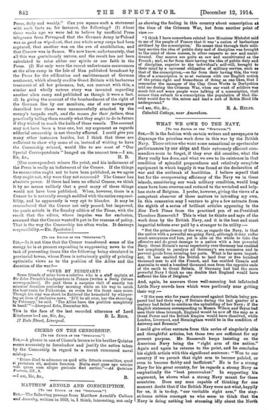THE WAR, THE PRESS, AND THE PUBLIC.
[To THI EDITOR 07 TIM "EirEcrAroa."] SIR,—In your article of last week headed "The Policy of Mystification " you say : " Such censorship as has been exercised in our columns has been the purely voluntary censorship which is exercised at all times, whether in war or in peace, by every editor who has any sense of public duty, and that remark, we believe, applies to the whole British Press, daily and weekly." Can you square such a statement with such facts as, for instance, the following ? (1) About three weeks ago wo were led to believe by unofficial Press telegrams from Petrograd that the German Army in-Poland was as good as wiped out, that one whole army corps had been captured, that another was on the eve of annihilation, and that Cracow was in flames. We now know, unfortunately, that all this was gratuitously untrue, and the result has not been calculated to raise either our spirits or our faith in the Press. (2) Not only were the recent unfortunate occurrences at the alien camp in the Isle of Man published broadcast by the Press for the edification and embitterment of German sentiment, which already credits Great Britain with barbarous treatment of all her prisoners, but, not content with this, a similar and wholly untrue story was invented regarding another alien camp and published as though it were a fact. (3) In giving the account of the bombardment of the right of the German line by our monitors, one of our newspapers described how these were unsuccessfully attacked by the enemy's torpedo craft, and the reason for their failure, thus practically telling them exactly what they ought to do in future if they wished to reach the hulls of these vessels. The account may not have been a true one, but my argument as regards editorial censorship is not thereby affected. I could give you many other instances besides, but I think that these are sufficient to show why some of us, instead of wishing to have the Censorship relaxed, would like to see most of "Our Special Correspondents " hanged on the nearest tree.—I am, [Our correspondent misses the point, and his indictment of the Press is really an indictment of the Censor. If the things he enumerates ought not to have been published, as we agree they ought not, why were they not censored ? The Censor has absolute power. If there had been no official Censor, we think it by no means unlikely that a good many of these things would not have been published. When, however, there is a Censor he is naturally enough saddled with the entire responsi- bility, and he apparently is very apt to blunder. It may be remembered that the Censor not only passed, but improved, the. panic article in the Sunday edition of the Times, with the result that the editor, whose impulse was for exclusion, assumed that the Censor wanted it put in for reasons of policy. That is the way the Censorship too often works. It destroys responsibility.—En. Spectator.]















































 Previous page
Previous page